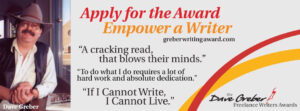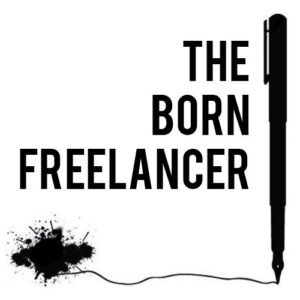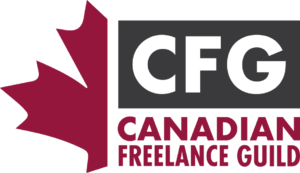Dave Greber Freelance Writers Awards aim to support social justice writing in Canada

Dave Greber could talk about writing for hours on end. The Calgary-based freelancer had an unquenchable enthusiasm for storytelling.
“You could see him come alive discussing writing,” says Dave’s partner, Shirley Dunn.
Twenty years after his death, Greber’s passion lives on in the form of awards for freelancers that Dunn created in his name.
Greber spent the latter part of his career writing books and articles focused on social justice issues and teaching writing at Mount Royal College. When he died suddenly in 2000, a visit from a group of his students inspired Dunn to find a way to honour his memory.
“I knew from what he said that the time between getting a contract to publish a book and the time of publication was very dry financially,” says Dunn.
She decided to create a fund to offer cash prizes for social justice-related books and magazine articles. Writers can submit their work for the award either pre- or post-publication.
The Dave Greber Freelance Writers Awards are aimed at helping freelancers pursue social justice journalism and reach a wider audience with their work.
“The hope is that social justice journalism impacts the general public,” says Dunn. “I chose social justice because in the latter years Dave was doing a lot of social justice writing, particular around the Holocaust. He was the child of Holocaust survivors.”
Read the rest of this post »
CFG FREE Special Presentation: The Class of Covid-19
 The winter session at the University of King’s College School of Journalism in Halifax started normally enough, until the biggest story of the century engulfed the world.
The winter session at the University of King’s College School of Journalism in Halifax started normally enough, until the biggest story of the century engulfed the world.
By Friday March 13th, all classes were cancelled, access to gear vanished, and the big end-of-semester show that usually caps the JOUR 3005 Mobile Video Journalism Class?
Would…could…should the show go on?
You know the answer to that.
Using their mobile phones, sometimes iffy Internet connections for online interviews, without tripods or microphones or proper editing facilities, they got to work – while keeping themselves safe in truly troubling times.
Join us on Sunday at 3 pm ET to share the Covid-19 news show they created, and hear from four of the students and their instructor – CFG Member Catherine Harrop – about how it all unfolded.
Who knows: You might learn some useful tricks.
You can register for this event right here. And as always, it’s free for CFG members.
Freelancers face new challenges during the COVID-19 pandemic
by Monte Stewart
This is part two in a series on the ways that Canadian freelancers are weathering COVID-19. Read part one right here.

Lesley Evans Ogden
Lesley Evans Ogden shares her home office with a pet bird.
Her feathered friend was there even before the coronavirus struck. But now the Vancouver-area freelancer, who specializes in science reporting, has to deal with her husband and two of their kids being around during working hours as well.
Evans Ogden is one of many Canadian freelancers who are adapting as they contemplate how the coronavirus will affect their livelihoods on a long-term basis.
In her case, the answer is “still emerging.”
“And, I expect it will continue to change over time,” said Evans Ogden.
Currently she has a backlog of deadlines assigned both before and after the pandemic was announced.
“All of these assignments have nothing to do with COVID-19. I’m writing those up as fast as I can because I’m anxious to contribute to COVID-19 reporting,” she said.
Anticipating that COVID-19 will be a big part of her work for the foreseeable future, Evans Ogden is preparing pitches for “solutions-based stories” in areas that interest her.
“But I’ll also make sure to mix [pitches] up with other topics I like to write about,” she said. “I know I will need to take my brain off the corona-channel some of the time for my own mental health.”
Evans Ogden advises freelancers to be flexible, “think outside the old box,” create opportunities, reject “shitty contracts” and, if necessary, seek help with contracts and other issues from the Canadian Freelance Guild.
“This is a brand new world,” she said. “We don’t have to operate in the same ways as before.”
Read the rest of this post »
Freelancers struggle to adapt to a shifting Canadian media landscape during COVID-19 pandemic
by Monte Stewart
This is part one in a series on the ways that Canadian freelancers are weathering COVID-19. Read part two right here.

Jeff Gaulin
Jeff Gaulin does not believe that the Canadian media landscape will go “back to normal” once the COVID-19 pandemic ends.
The owner of the popular journalism job site says the pandemic has been “devastating” for his website and all of the journalists who rely on it.
“Freelance journalists will need to adapt more than ever before, and find out what their edge or unique selling proposition is in this increasingly volatile and competitive market,” he said.
But even though freelancers are scrambling during the pandemic, Gaulin says, there is still demand for freelance services as news outlets strive to keep their fixed costs low but still access reporters.
Overall, the number of jobs posted on Jeffgaulin.com has declined more than 90 per cent. But Gaulin says all of the jobs posted on his site in the past month were freelance-based.
“Journalism is an essential service in Canadian society, so I am glad to see there are freelance opportunities for journalists,” he said.
“On the other hand, there is more competition [among freelancers] than ever before, and the prices paid are dropping dramatically, as most media outlets are losing their primary source of revenue – advertising.”
Read the rest of this post »
The Born Freelancer Asks, How You Doin’
This series of posts by the Born Freelancer shares personal experiences and thoughts on issues relevant to freelancers. Have something to add to the conversation? We’d love to hear from you in the comments.

In my last column I talked about how, in many ways, freelancers are equipped for this crisis and its requirements (such as working at home) based upon our characteristically independent natures.
The enforced social distancing/self-isolation must seem trivial to those actually struck down with illness but, for the rest of us, it remains the most challenging aspect of the pandemic.
There is, however, a qualitative difference between choosing the independence that freelancing can bring (if you so wish it) – and having social distancing and its onerous conditions imposed upon you.
It’s called having control. Or lack thereof.
For some freelancers (and others) I suspect this is key to the state of our mental health.
One of the big attractions of freelancing is the feeling (illusion?) of control — for whom you work, the nature of your work, where you work, etcetera. You don’t have to be a “control freak” to be a freelancer – but it sure doesn’t hurt.
I think the low level anxiety many of us are feeling is, fundamentally, a sense that things are out of our control.
For some freelancers, without that usual sense of control, life may have lost essential qualities of its previously understood definition and context.
So it’s important to rebuild some meaning and put it back into our lives.
Read the rest of this post »
Canadian Freelance Guild progress update
 One month ago we launched our new association, the Canadian Freelance Guild.
One month ago we launched our new association, the Canadian Freelance Guild.
Since that time we’ve been busy creating resources for our members and looking for new ways to help self-employed creators during this difficult time.
Here’s an update on what we’ve been up to.
• The CFG Job Bank for members is now live! This compendium of opportunities for freelancers is pushed out a number of times each week by CFG members Rachel Sanders and Robyn Roste. The gigs and contract opportunities cover a wide range of communications services being sought by traditional and digital media outlets along with more corporate copywriting, copy editing, and technical writing. Over the past two weeks, the Job Bank has already posted 70 opportunities! There’s a lot of work out there, don’t miss out. Members can view and subscribe to the Job Bank right here.
• The CFG website also now features a calendar of upcoming events. On it you’ll be able to find details about upcoming webinars, including two May Day Meet-ups (Zoom tours of our new CFG website) with organizer Don Genova and tech guru George Butters on Friday May 1, and a Lunch and Learn about the ABCs of podcasting on Thursday May 7.
• Other resources that will be coming soon are print-your-own membership cards (until permanent cards can be manufactured), and a new application process for media cards offered to accredited journalist members. And we’ll soon have a full slate of CFG logos in various shapes and sizes along with a design guide for their use on members’ websites and blogs.
• And a final note, one of our new CFG members, videographer Steve Hawkins has put together an excellent short documentary showing the creation of a mural by local artists on a boarded-up shop in downtown Vancouver. It’s a great example of the volunteer spirit being shown during Covid-19, and it’s also a great way for Steve to showcase his talents. While Steve has long-term experience as an employee at various media outlets, he is just entering his freelance career. View the video right here. It’s guaranteed to bring a happy tear to your eye.
WEBINAR: Podcasting ABCs
 The traditional communication methods your clients use are rapidly changing. Being able to offer them podcasting options is just one more skill you should have in your arsenal. Thanks to today’s technology, the learning curve is less steep and making podcasts is more affordable than ever before.
The traditional communication methods your clients use are rapidly changing. Being able to offer them podcasting options is just one more skill you should have in your arsenal. Thanks to today’s technology, the learning curve is less steep and making podcasts is more affordable than ever before.
Join veteran podcast producer Katie Jensen for this Lunch and Learn session called Podcasting ABCs on Thursday, May 7 from noon to 1 pm Eastern Time.
You will find out A) how it works B) how can you do it? C) how much does it cost to set up? and D) much, much more.
Katie Jensen is a freelance podcast producer based in Toronto. She’s made podcasts for CBC Podcasts, Maple Leaf Sports & Entertainment, The Globe and Mail, Polaris Music Prize, St. Joseph Media, Canada Media Fund, The Atkinson Foundation, George Brown College, StarMetro, and Canadaland.
Katie is also the principal of Vocal Fry Studios, a podcast production studio creating original shows and originating Podcast Night School, Canada’s first podcast accelerator & pitch competition.
This one-hour webinar will be conducted using the Zoom platform. It is free for Canadian Freelance Guild members and costs just $20 for non-members.
Each participant will be entered into a draw for one of three prizes, consisting of an hour of free consultation with Katie… a priceless incentive! To register for this webinar click here.
2020 Dave Greber Freelance Writers Awards open for submissions
Freelancers, if you’ve written about social justice issues this year, it’s time to submit your work for the Dave Greber Freelance Writers Book and Magazine Awards.
The awards are now open for submissions and the competition closes on Friday June 26, 2020 at 5:00 P.M. PST.
The awards honour the memory of Dave Greber, a Calgary-based freelancer who wrote extensively about social justice issues during the final decade of his career. The awards were created in 2004, and are given each year to writers of social justice-related non-fiction.
The book award is worth $5,000 and the magazine award is set at $2,000. Work that has not yet been completed for publication is also eligible for submission. To submit your work, you must be a resident of Canada and spend 70% of your working time as a self-employed freelance writer.
For more details about the award requirements, see the Dave Greber Awards website.
And you can read Story Board’s interviews with some of the past Dave Greber Award winners right here.
WEBINAR: Income Replacement and Taxes during Covid-19
 A free CFG Lunch and Learn webinar is planned for members in good standing on Tuesday, April 14th at 12 noon ET.
A free CFG Lunch and Learn webinar is planned for members in good standing on Tuesday, April 14th at 12 noon ET.
A representative from the New School of Finance will bring us up to date on government initiatives for income replacement as well as other protections for the self-employed and others affected by the Covid-19 pandemic.
There will also be information about filing your income tax for 2019 and we’re leaving ample time for a Q+A session.
If you’re a CFG member click here to register.
For more information about to cost and benefits of membership, check out this page on the Canadian Freelance Guild website.
Canadian Freelance Guild launches
 We did it! On Wednesday, April 1st, we welcomed into the world a brand new association for freelancers.
We did it! On Wednesday, April 1st, we welcomed into the world a brand new association for freelancers.
On January 14th of this year, PWAC members voted to join the independent membership of the Canadian Media Guild Freelance Branch at a new home with a new name, the Canadian Freelance Guild.
Within a scant two and a half months of the vote, a dedicated transition team has merged the two membership databases, launched a new website and a new logo, developed bylaws, and is already offering timely professional development webinars as one of the main benefits of membership.
April 1st marked the day that all former PWAC members were asked to renew their yearly dues (at a new, lower rate of $150 per year) and we got the payment system working as well. Yes, a few glitches, but that was to be expected.
Both PWAC and CMG Freelance have a long-standing reputation of defending freelance rights and providing professional development and advice for our respective memberships. That will carry on as a basic tenet of the CFG.
There are plans in the works to offer a number of webinars to members in good standing over the coming weeks.
Need to learn how to get more from Zoom, the popular video meeting software? We’re offering Session III of our popular Zoom tutorial on April 6th. The first two sessions were booked solid in short order, so don’t wait. If you’re a member, click here to register!
And on April 14 at noon ET, a representative from the New School of Finance will tell us about government initiatives for income replacement and other protections for the self-employed and others affected by the COVID-19 pandemic. There will also be information about filing your income tax for 2019 and we’re leaving ample time for a Q+A session. If you’re a member, click here to register now.
A founding convention and election of officers for our new association will be held in October of 2020.
Together, we’re better.
Don Genova and Doreen Pendgracs
Transition Committee Co-Chairs
Canadian Freelance Guild



